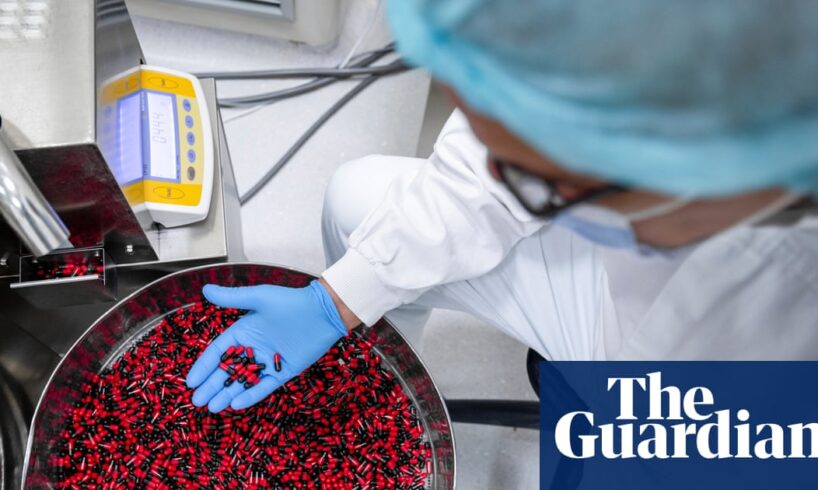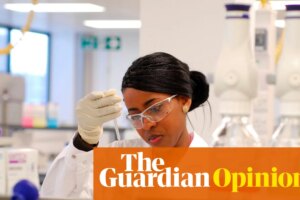
The US drugmaker Merck has scrapped a £1bn London research centre and is laying off 125 scientists in the capital this year, in a big blow to the UK’s important life science sector.
Keir Starmer’s government has described life sciences as “one of the crown jewels of the UK economy” and the previous Conservative government had vowed to turn the country into a “global science and technology superpower” by 2030.
The planned new lab, called the UK Discovery Centre, at the Belgrove House site opposite St Pancras and King’s Cross stations, was already under construction and scheduled to open in two years’ time. It had been expected to employ about 800 people overall, including 180 scientists.
As part of its U-turn, Merck, known as MSD in Europe, will vacate laboratories at the nearby London Bioscience Innovation Centre, which hosts more than 60 life science companies, and the neighbouring Francis Crick Institute by the end of 2025, with the loss of about 125 scientific jobs.
The New Jersey-based company said it would move the research operations to other sites. It is unclear where in the world it would be, but pharmaceutical companies are under pressure from Donald Trump to invest more in the US. The company declined to provider further details.
In a statement, MSD announced “plans to discontinue discovery research operations in the UK and that it no longer plans to occupy the Belgrove House site at King’s Cross”.
“This … reflects the challenges of the UK not making meaningful progress towards addressing the lack of investment in the life science industry and the overall undervaluation of innovative medicines and vaccines by successive UK governments,” it said.
MSD had previously said the research centre would build on the company’s 100-year heritage in the UK, close to London’s Knowledge Quarter and its Moorgate headquarters. It will keep its HQ and a large animal health site in Milton Keynes.
Lengthy negotiations between the government and the industry over the cost of medicines for the UK broke down last month. Under the voluntary pricing and access scheme, companies agree to pay back a certain amount of revenue they make from newer, branded drugs. In 2023, the rebate rate rose to 23.5%, which compares with 5.7% in France and 7% in Germany.
Richard Torbett, chief executive of the Association of the British Pharmaceutical Industry (ABPI), said: “This is a real blow to the UK’s life sciences ambitions. No one wants to hear that successful and innovative companies like MSD are reducing their investment and footprint in the UK.”
Referring to a recent survey from Deloitte, and the UK’s trade deal with the US, a government spokesperson said: “The UK has become the most attractive place to invest in the world, but we know there is more work to do. Through our life sciences sector plan, we’re taking decisive action to further unlock innovation, drive investment and boost growth.”
The news came as a report showed that the UK had lost ground to rivals in the global race for pharmaceutical investment and research.
Investment in life sciences research and development (R&D) in the UK has underperformed against global trends since 2018, according to the study from the ABPI and the consulting firm PwC.
It said a significant slowdown began in 2020, when the rate of growth in R&D investment fell to 1.9% annually, down from 6.3% in the three preceding years and lagging behind the global average of 6.6%. R&D investment by the pharmaceutical industry even fell in 2023, the final year of the study, by nearly £100m.
At £795m, investment by foreign life sciences companies in the UK was 58% lower in 2023 than in 2017, when it stood at £1.9bn. This meant that the country declined in global rankings from second place in 2017 and 2021 to seventh place in 2023.
skip past newsletter promotion
Sign up to Business Today
Get set for the working day – we’ll point you to all the business news and analysis you need every morning
Privacy Notice: Newsletters may contain information about charities, online ads, and content funded by outside parties. If you do not have an account, we will create a guest account for you on theguardian.com to send you this newsletter. You can complete full registration at any time. For more information about how we use your data see our Privacy Policy. We use Google reCaptcha to protect our website and the Google Privacy Policy and Terms of Service apply.
after newsletter promotion
The UK has also fallen behind on clinical trials of new medicines. It ranked eighth for late-stage industry trials in 2023, down from fourth in 2017, although there were “small signs of improvement” in 2023, according to the report.
Rippon Ubhi, who runs Sanofi’s UK and Ireland business and the French company’s speciality care division, said: “The findings in this report paint a concerning picture for UK patients and our economy.
“The UK is increasingly being viewed as ‘uninvestable’ in global boardrooms due to unprecedented [NHS] clawback rates and restrictive patient access to medicines. While other countries are actively investing in innovative medicines for patients, the UK is falling behind.”
The UK head of the Swiss pharmaceutical firm Novartis, Johan Kahlström, has also said high costs means the UK is “largely uninvestable,”, while the health secretary, Wes Streeting, has pledged that he will not allow firms to “rip off” taxpayers.
The government has set a target to position the UK as the leading life sciences economy in Europe by 2030 and third globally by 2035, while the chancellor, Rachel Reeves, has said the UK is at the forefront of developments in the sector.
Torbett said: “The UK has a world-class science base and the potential to lead globally in developing the next generation of medicines and vaccines. But without a more competitive environment for investment, we risk losing out to other countries making bold moves to attract internationally mobile investment.”
Only 37% of new medicines are made fully available for their licensed indications in the UK, compared with 90% in Germany. ABPI data shows that more than 60 medicines did not launch in the UK or were delayed between 2019-20 and 2022-23.





